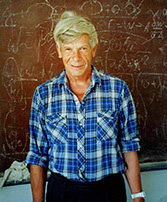Speakers
Description
We build a systematic calculational method for the covariant expansion of the two-point heat kernel $\hat K(\tau|x,x')$ for generic minimal and non-minimal differential operators of any order. This is the expansion in powers of dimensional background field objects -- the coefficients of the operator and the corresponding spacetime and vector bundle curvatures, suitable in renormalization and effective field theory applications. For minimal operators whose principal symbol is given by an arbitrary power of the covariant Laplacian $(-\Delta)^M$, $M>1$, this result generalizes the well-known Schwinger--DeWitt (or Seeley--Gilkey) expansion to the infinite series of positive and negative fractional powers of the proper time $\tau^{1/M}$, weighted by the generalized exponential functions of the dimensionless argument $-\sigma(x,x')/2\tau^{1/M}$ depending on the Synge world function $\sigma(x,x')$. The coefficients of this series are determined by the chain of auxiliary differential operators acting on the two-point parallel transport tensor, which in their turn follows from the solution of special recursive equations. The derivation of these operators and their recursive equations are based on the covariant Fourier transform in curved spacetime. The series of negative fractional powers of $\tau$ vanishes in the coincidence limit $x'=x$, which makes the proposed method consistent with the heat kernel theory of Seeley--Gilkey and generalizes it beyond the heat kernel diagonal in the form of the asymptotic expansion in the domain $\sigma(x,x')\ll\tau^{1/M}$, $\tau\to 0$. Consistency of the method is also checked by verification of known results for the minimal second-order operators and their extension to the generic fourth-order operator.

